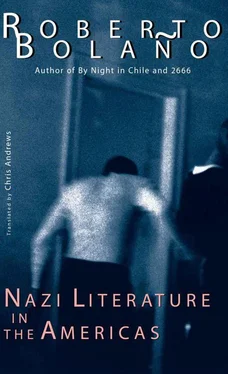The first guests arrived at nine in the evening. At 11:00, twenty people were present, all of them moderately drunk. No one had yet entered the spare bedroom, occupied by Ramírez Hoffman, on the walls of which were displayed the photos he was planning to submit to the judgment of his friends. Lieutenant Curzio Zabaleta, who years later was to publish the self-denunciatory book Neck in a Noose , relating his activities during the early years of the military régime, informs us that Ramírez Hoffman behaved normally, attending to the guests as if he were in his own home, greeting friends from the air force academy whom he hadn’t seen for a long time, good-naturedly commenting on the morning’s incidents, cheerfully cracking and tolerating the jokes that are invariably prompted by such gatherings. Now and then he disappeared (shutting himself in the spare bedroom) but he was never gone for long. Finally, on the stroke of midnight, he called for silence and said (these are his actual words, according to Zabaleta) that it was time to plunge into the art of the future. He opened the bedroom door and began to let the guests in one by one. One at a time, gentlemen; the art of Chile is not for the herd. According to Zabaleta, he said this in a jocular tone, looking at his father and winking first with his left eye, then with his right. The first person to enter the room, logically enough, was Tatiana von Beck Iraola. The room was well and normally lit. No blue or red lights, no special atmosphere. Outside, in the corridor, and back in the living room, the guests all went on talking or drinking immoderately, like the young men and the victors that they were. The smoke was thick, especially in the corridor. Ramírez Hoffman stood by the doorway. Two lieutenants were arguing in front of the bathroom. Ramírez Hoffman’s father was one of the few who patiently kept his place in the line. Zabaleta, as he admitted in his confession, kept pacing nervously back and forth, filled with foreboding. The two surrealist reporters were talking with the owner of the apartment. At some point Zabaleta caught a snatch of their conversation: travel, the Mediterranean, Miami, tropical beaches, and voluptuous women.
Less than a minute after going in, Tatiana von Beck emerged from the room. She was pale and shaken. She stared at Ramírez Hoffman, then tried to get to the bathroom, unsuccessfully. After vomiting in the passage, Miss von Beck staggered to the front door with the help of an officer who gallantly offered to take her home, although she kept saying she would prefer to go alone. The second person to enter the room was a captain. He remained inside. Standing by the door, which was left ajar, Ramírez Hoffman smiled with an air of growing satisfaction. In the living room, some of the guests asked what on earth had got into Tatiana. She’s just drunk, said a voice that Zabaleta didn’t recognize. Someone put on a Pink Floyd record. How can you dance when there are no women? It’s like a fags’ convention here, someone said. The surrealist reporters whispered to each other. A lieutenant proposed they all go and find some whores straight away. Meanwhile there was hardly any talking in the hallway, as if it were a dentist’s or a nightmare’s waiting room. Ramírez Hoffman’s father made his way forward and went in. The owner of the apartment followed him. Almost immediately he came out again, went up to Ramírez Hoffman, and for a moment it looked as if he would hit him, but then he turned away and stormed off to the living room in search of a drink. Now everyone, including Zabaleta, pressed into the bedroom. The captain was sitting on the bed, smoking and reading some notes; he seemed calm and absorbed. Ramírez Hoffman’s father was contemplating some of the hundreds of photos with which the walls and part of the ceiling had been decorated. A cadet who happened to be present, though what he was doing there Zabaleta could not explain, started crying and swearing, and had to be dragged out of the room. The surrealist reporters looked disapproving but maintained their composure. All the talking had suddenly ceased. Zabaleta remembers that the only sound was the voice of a drunken lieutenant, who hadn’t yet joined the others, making a phone call in the living room. He was arguing with his girlfriend and incoherently apologizing for something he had done a long time ago. The rest of the guests went back to the living room in silence and some left hurriedly, barely taking the time to say goodbye.
Then the captain made everyone leave the room and shut himself in with Ramírez Hoffman for half an hour. According to Zabaleta, eight people were left in the apartment. Ramírez Hoffman’s father didn’t seem particularly disturbed. Slumped in an armchair, the owner of the apartment looked at him resentfully. If you like, said Ramírez Hoffman’s father, I’ll take my son away. No, said the owner of the apartment, your son is my friend, and friendship is sacred in Chile. He was completely drunk.
A couple of hours later three military intelligence agents arrived. Zabaleta thought they would arrest Ramírez Hoffman, but what they did was go into the bedroom and clear away the photographs. The captain left with the agents, and for a while no one knew what to say. Then Ramírez Hoffman emerged from the bedroom, walked over to the window and lit a cigarette. The room, Zabaleta recalls, felt like the looted cold-storage vault of a giant butcher’s shop. Are you under arrest? the owner of the apartment finally asked. I guess so, said Ramírez Hoffman, without turning to face them, looking out at the lights of Santiago, the sparsely scattered lights of Santiago. With painfully slow movements, as if he had to gather his courage, Ramírez Hoffman’s father drew near and finally gave him a quick hug. Ramírez Hoffman did not respond. Why the drama? asked one of the surrealist reporters beside the ashen hearth. You can shut up, said the owner of the apartment. What do we do now? asked a lieutenant. Sleep it off, replied the host. Zabaleta never saw Ramírez Hoffman again. But that last image was indelible: the big living room a mess; bottles, plates and overflowing ashtrays, a group of pale, exhausted men, and Ramírez Hoffman at the window, showing no sign of fatigue, with a glass of whisky in his perfectly steady hand, contemplating the dark cityscape.
The reports of Ramírez Hoffman’s activities from that night on are vague and contradictory. His shadowy figure makes a number of brief appearances in the shifting anthology of Chilean literature, always enveloped in mist, elegant as a dragon. According to some rumors, he was expelled from the air force. The most unbalanced minds of his generation claimed to have seen him wandering around Santiago, Valparaíso, and Concepción, working at a variety of jobs and participating in strange artistic projects. He changed his name. He was associated with various ephemeral literary magazines, to which he contributed proposals for happenings that never happened, unless (and it hardly bears thinking about) he organized them in secret. A theatrical magazine published a short play by a certain Octavio Pacheco, who was a mystery to everyone. This play is odd, to say the very least, and the action unfolds in a world inhabited exclusively by Siamese twins, where sadism and masochism are children’s games. Ramírez Hoffman was said to be working as a pilot for a commercial airline whose flights linked South America with certain cities in the Far East. Cecilio Macaduck, poet and shoe-store salesman, followed his trail thanks to a document-storage box he happened to discover at the National Library, containing the only two poems published by Emilio Stevens, photographic records of Ramírez Hoffman’s aerial poems, Octavio Pacheco’s works for the theatre, and texts that had appeared in various magazines in Argentina, Uruguay, Brazil and Chile. Macaduck was flabbergasted: he found at least seven Chilean magazines published between 1973 and 1980 that he’d never heard of. He also came across a slender octavo volume entitled Interview with Juan Sauer . The book bore the imprint of The Fourth Reich in Argentina. It didn’t take long to ascertain that Juan Sauer, who spoke in the interview about photography and poetry, was none other than Ramírez Hoffman. In his replies he sketched out a theory of art. Disappointing, according to Macaduck. Yet in certain literary circles, both in Chile and elsewhere in Latin America, his poetic career, brief and dazzling as a lightning bolt, inspired a kind of cult, in spite of the fact that few devotees had an accurate idea of what he had written. Finally he left Chile behind, along with public life, and disappeared, although his physical absence (he had, in fact, always been an absent figure) did not put a stop to the speculations and interpretations, the passionate and contradictory readings to which his work gave rise.
Читать дальше












